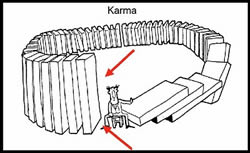Difference between Fate and Karma
Key Difference: Fate is a set of predetermined set of actions or course. It refers to a pre-set or an unchangeable future that will happen regardless of what anyone does. It does not give the person an option or a will. Karma states that a person is the one who decides what happens, where the action or deeds of a person, determine what the person receives.
‘Fate’ and ‘Karma’ are two different philosophies that are a part of nature. Many people believe that fate and karma go hand-in-hand and have a similar meaning, but this is not true. Fate, destiny and karma are two complete different philosophies of life.
 Fate is a set of predetermined set of actions or course. It refers to a pre-set or an unchangeable future that will happen regardless of what anyone does. It does not give the person an option or a will. A person, no matter how much he/she tries cannot change the outcome of fate. Fate denotes that a person’s whole life is a set of predetermined events, that had to happen, a person from the time he was born, to where he was born, what will be his career and how will he die is already set in stone.
Fate is a set of predetermined set of actions or course. It refers to a pre-set or an unchangeable future that will happen regardless of what anyone does. It does not give the person an option or a will. A person, no matter how much he/she tries cannot change the outcome of fate. Fate denotes that a person’s whole life is a set of predetermined events, that had to happen, a person from the time he was born, to where he was born, what will be his career and how will he die is already set in stone.
The concept of fate is based on the belief that there is a fixed natural order to the cosmos. The origin of the concept of fate can be dated back to the Ancient Greece and Ancient Rome, where the Gods would determine the fate of a person. In the Ancient times, the Moirai (Greek mythology), Parcae (Roman mythology), Norns (Norse mythology) or Fates as they are known in English are goddesses that were in charge of spinning the thread that represented a person’s life. The concept of fate relies heavily on the existence of a great, almighty force that decides the future of every human.

The concept of ‘karma’ differs greatly, while fate states that one does not have a choice as everything is predetermined, karma states that a person is the one who decides what happens. The philosophy of karma puts the power in the hands of man. The law of Karma states the action or deeds of a person, determine what the person receives. The concept of karma is based heavily on the Universal Law of Cause and Effect. This law states that every action has an equal and opposite reaction.
Karma states that a person who does good deeds will receive good deeds done to him in return, while a person who does bad deeds will receive bad deeds done to him in return. Some religions that follow this belief state that a person is born with a book, similar to an account sheet with liabilities and assets, where all good and bad deeds are noted, which will be reflected when the person is reborn. The karma is stated to be a cycle, where the karma of a person never ends, it just simply follows him into the next life. The cycle starts when a person is born and the circle continues till the person has not finished all their lives and attained moksha. The concept of karma originated in India and is followed in the Hindu, Jain, Buddhist and Sikh religions; however it is now being followed world-wide.
Image Courtesy: insearchofafamily.com, theosophy.org.nz









Comments
Syed
Mon, 09/25/2017 - 19:54
Add new comment